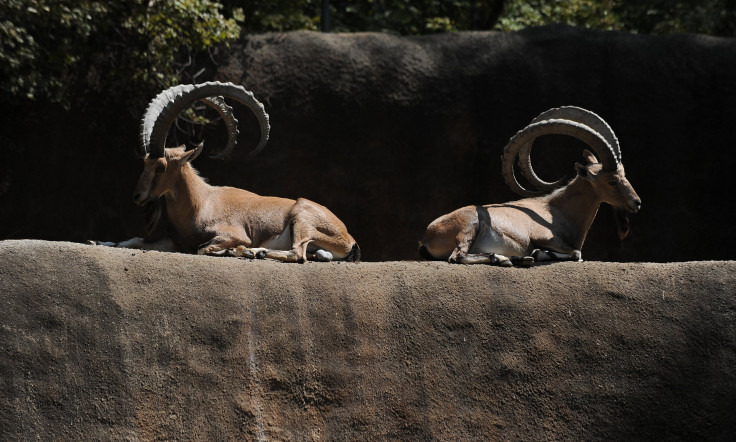What Is Nubian Ibex? Los Angeles Zoo Euthanizes Entire Herd Of Goats

A Los Angeles zoo euthanized an entire herd of Nubian Ibex goats after they were diagnosed with a highly contagious strain of herpes.
A Nubian Ibex is a species of goats that dwells in the arid mountainous regions of Algeria, Israel, Jordan, Saudi Arabia, Oman, Egypt, Ethiopia, Eritrea, Yemen, Lebanon and Sudan. They are typically 2.1 to 2.6 feet tall and light tan in color and have long thin horns that shoot up from their head and coil backward. Some of the male Nubian Ibex goats have a dark brown stripe down the back.
The zoo in a statement said Thursday that while their decision to euthanize the entire herd of Nubian Ibex was “difficult,” it was nevertheless the right one for the sake of protecting the other four-legged creatures housed by the facility, Los Angeles Times reported.
It said the decision was taken because there was no way to move the mountain goats to some other facility without endangering the lives of the animals inside that facility.
"The Nubian ibex could not be sent to any other facility housing hoofed animals, as those animals could contract the disease and die," the zoo said in a statement. "It would have been irresponsible of the zoo to send the Nubian ibex to another facility knowing they could cause harm."
Zoo officials suspected the herd of Nubian Ibex was infecting other animals when a group of six African antelopes tended by them died October due to malignant fever. After the source of the illness was traced back to the Nubian ibex, they knew that they had no other option but to euthanize the entire herd to prevent the spread of the virus.
The herpes virus carried asymptomatically by the Nubian ibex can be life-threatening to hoofed animals but cannot be transmitted to humans. The exact number of Nubian Ibex goats euthanized was not specified by the zoo.
Zoo spokeswoman April Spurlock said some of the symptoms of the disease include depression, loss of appetite, a rough hair coat and nasal discharge. "The entire process from symptoms to death is often very rapid," she told LA Times.
This disease is mostly found in underdeveloped nations and rarely seen in the United States. Prashant Khetan, CEO of animal-rights group Born Free USA, characterized the decision to euthanize the goats as “tragic” and underscored the reason wild animals do not belong within the confines of a zoo.
"They belong in their natural habitat, in the wild," he said. "I think we're taking them out of, sort of, nature's course and putting them into situations where they're being used for entertainment."
Jennifer Langan, a clinical professor of zoological medicine at the University of Illinois and a senior staff veteran at the Brookfield Zoo outside Chicago said the decision to put down an entire herd of animals must have been as hard for the zoo owners as it is for a pet owner to euthanize a suffering cat or dog.
“Those are always incredibly difficult decisions, made with forethought and empathy,” Langan said. “None of these decisions are ever made lightly and I'm sure it was incredibly difficult for staff at the zoo.”
The decision to euthanize the goats comes at a time when the Nubian ibex population is fast dwindling due to habitat loss and illegal poaching practices. The goat species was declared “vulnerable” by the International Union for Conservation of Nature with an estimated 2,500 left in the wild.
© Copyright IBTimes 2024. All rights reserved.






















